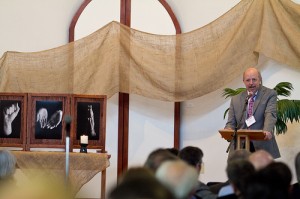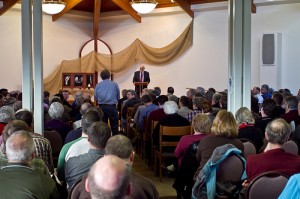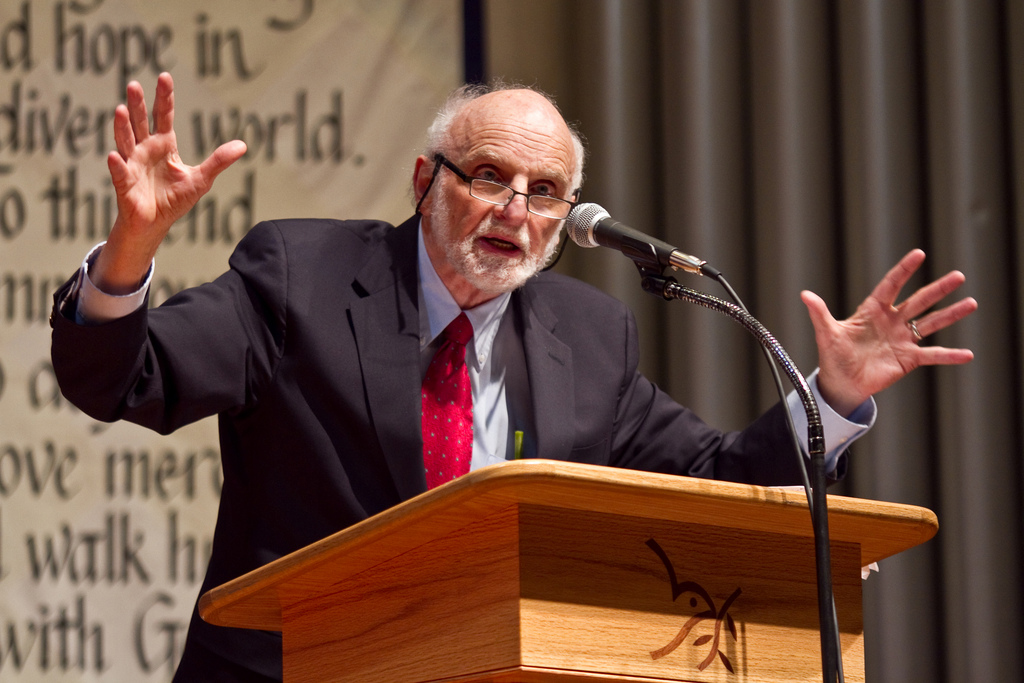Beware of seduction by accumulation. That was one of the money issues explored by Walter Brueggemann, a world-renowned Old Testament scholar, in talks to as many as 700 people gathered at Eastern Mennonite University (EMU) Jan. 16 through 18.
In his three packed lectures at EMU’s annual School for Leadership Training, Brueggemann talked about two narratives: the narrative of accumulation, demonstrated by Pharaoh in the Old Testament, and the narrative of abundance, demonstrated by manna in the desert in the Old Testament and the feeding of the 5,000 in the New Testament.
Podcasts of Brueggeman’s lectures and talkback sessions are available online.
Pharaoh and accumulation
“The narrative of accumulation dominates our society and it is enormously seductive,” he said.
Using Pharaoh, Solomon, and the parable of Jesus about the rich man who tore down his barns and built bigger ones, Brueggemann demonstrates that this narrative only leads to death, both the death of the wealthy individual and the death of the poor.
“Accumulation promises to make us safe and happy, but it cannot,” he said. “Anxiety about scarcity leads to accumulation, which leads to monopoly, which leads to violence.
Brueggemann said God is the source of all bounty, including food, and thus is the central player in the narrative of abundance.

God and abundance
“Moving from scarcity to abundance depends on understanding that the world is God’s creation, not a system of zero-sum economics,” Brueggemann said. He called on his listeners to practice their faith by living gratefully instead of anxiously.
The accumulation narrative and the abundance narrative are “deeply contradictory,” said Brueggemann. Yet most people try “to juggle them and hope no one notices.”
Brueggemann called on the church to do “more truth-telling about the deathliness of the [accumulation] system,” even if the church’s stance is called unrealistic by many. “The gospel is fiction when judged by the empire, but the empire is fiction when judged by the gospel.”
Disengagement with accumulation begins with Sabbath
In his Jan. 18 talk, Brueggemann said that practicing Sabbath is one way to move from accumulation to abundance.
“Sabbath is a deliberate, disciplined pause in the narrative of accumulation,” said Brueggemann. “We are most imitating God when we trust creation enough to rest.
“A society that does not practice Sabbath is a society of depleted selves. And the less self I have the more I want to surround myself with signs and symbols of value to keep persuading myself that there is something good going on in my life even if it is relatively empty at the center.”
The 2012 School for Leadership Training was sold out, with 340 people registered. Several hundred more people attended evening lectures on Monday, Tuesday and Wednesday evening.
The theme “God and Mammon: Reframing Stewardship Amidst Abundance, Scarcity and Conflict” seemed relevant in the midst of political discussions and debates about the economy, poverty and taxes.
Brueggemann inspires participants
“The way Brueggemann used scripture to read our current situation was helpful in creatively seeing our story in scripture and using that to prod us, ” said Joel Miller, pastor of the Cincinnati (Oh.) Mennonite Church.

Barry Kreider, pastor at Pilgrims Mennonite Church in Akron, Pa., said Brueggeman “breathed life” into familiar Biblical stories: “I appreciated the way Brueggemann used Biblical studies to follow lines through both the Old and New Testament and connect them.”
Workshops followed the themes of money, finances, poverty, stewardship, and business. Referring to a living-more-with-less workshop she attended, seminary student Angela Nash said, “It has been a challenge for me to think about how I can live simply in my community and model that for others, without it becoming like a law, or being judgmental.”
A photo gallery is available through emu.edu/photos/slt-2012.
